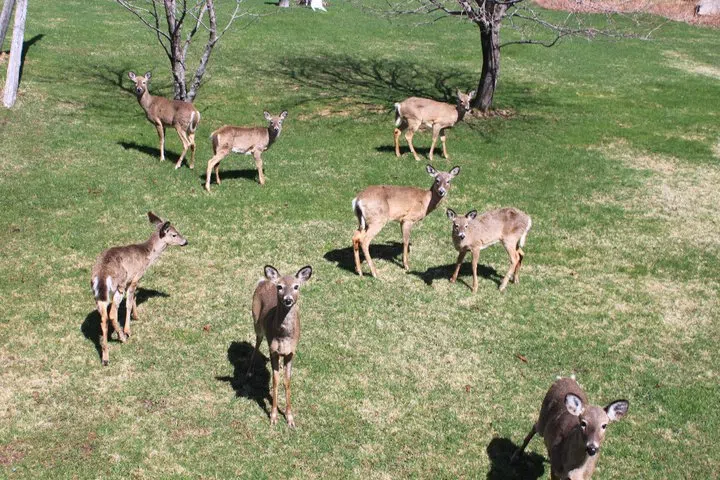
Questions and concerns from Millidgeville residents about this fall’s deer management program were dealt with at an open house Wednesday night.
Deer biologist Joe Kennedy says homeowners can apply for permits, which will allow hunters to shoot one antlerless, female deer each on their property.
It’ll be up to the Department of Energy and Resource Development to assess each application to ensure there are no land layout or public safety concerns.
The program will get underway during this fall’s hunting season, which lasts seven weeks in October and November.
According to new research, a regulated public hunt is the number one way to deal with urban deer populations. The second most effective method is sharp-shooting, a method that isn’t as popular in Canada as it is in the United States.
“We wish to put some fear back into these deer so that the deer can understand it’s not accepted to persist in people’s front yards,” Kennedy said during the meeting.

Joe Kennedy is a deer biologist, and has been working with the Department of Energy and Resources on deer management programs.
He says the program has already been successful in a number of other places in New Brunswick, including the Kennebecasis Valley.
“By harvesting the adult breeding females, we can lower the population over a long term period, and we’re seeing that in the Kennebecasis Valley. We’re on top of population growth so now we’re going to start working on lowering the overall population,” he said.
The numbers are still unknown for Saint John, but Kennedy shared from recent data from the Valley to help give residents a better picture of the program’s impact.
In 2018, 71 properties applied for permits, and 334 were issued. Only 229 of those permits were given out to hunters, and 101 deer were killed. Kennedy says that’s about a 44 per cent success rate.
He says those numbers reflect a now stable deer population.
In Millidgeville, numbers will likely be lower, as they have assessed only 30 properties to have “huntable land,” or properties with 100 metres or more between another house.
However residents would be allowed,on a case-by-case basis, to remove that 100-metre requirement if all neighbours in an area were on board. He says this has been done in the KV before, and does require a lot of cooperation and communication.
While Kennedy says this project is supposed to help in the long-term, there are many ways for residents to protect their properties in the short-term.
“We’re certainly encouraging property owners to fence their properties and use repellents. If you have gardens you want to protect on our lands, the city has ensured that there’s no bylaw that prevents you from fencing your property, so we’re certainly encouraging that,” he said.
Kennedy says that deer are wild animals, and is also encouraging residents to scare them off, or “haze” them instead of posing for pictures.
Questions and Concerns
One attendee asked if he could take matters into his own hands, and use a pellet or paintball gun to scare deer off.
Kennedy explains that would cross a line from hazing to harassment, which is illegal.
Another attendee voiced concerns over the hunting process itself, and asked why sharp-shooting isn’t being used. From a humanity standpoint, she claims the guns cause less pain, and get the job done faster.
Kennedy explains that’s not true anymore.
“The new modern equipment that’s available to hunters these days…are very high technology, very effective, and the equipment modern hunters are using are very efficient at taking animals down humanely.”
He says, in fact, bow hunting is often more humane, as the arrows kills quicker and less painfully than sharpshooting.
Michael Carson lives on the outskirts of Millidgeville, so his property won’t be included in the program, but he says his yard is overrun with deer.
He says his biggest concern is the safety of his children, and others in his neighbourhood.
“We can’t have the kids in the yard unless they’re supervised,” he says. The number of deer running through have already proven to be dangerous, knocking over his grandson two weeks ago.
Carson also thinks the program is too limited, and hopes to see it expanded.
Councillor Gary Sullivan, who also lives in Millidgeville, was in attendance. He says there is possibility for the program to be expanded to other areas of the city, but first behaviours have to change.
“People need to be reminded, first of all, that it is now illegal to feed deer. We need deer to survive in their natural habitat and in the suburbs is not their natural habitat,” he said.
“This is not just a Millidgeville problem. This is a city-wide issue.”






